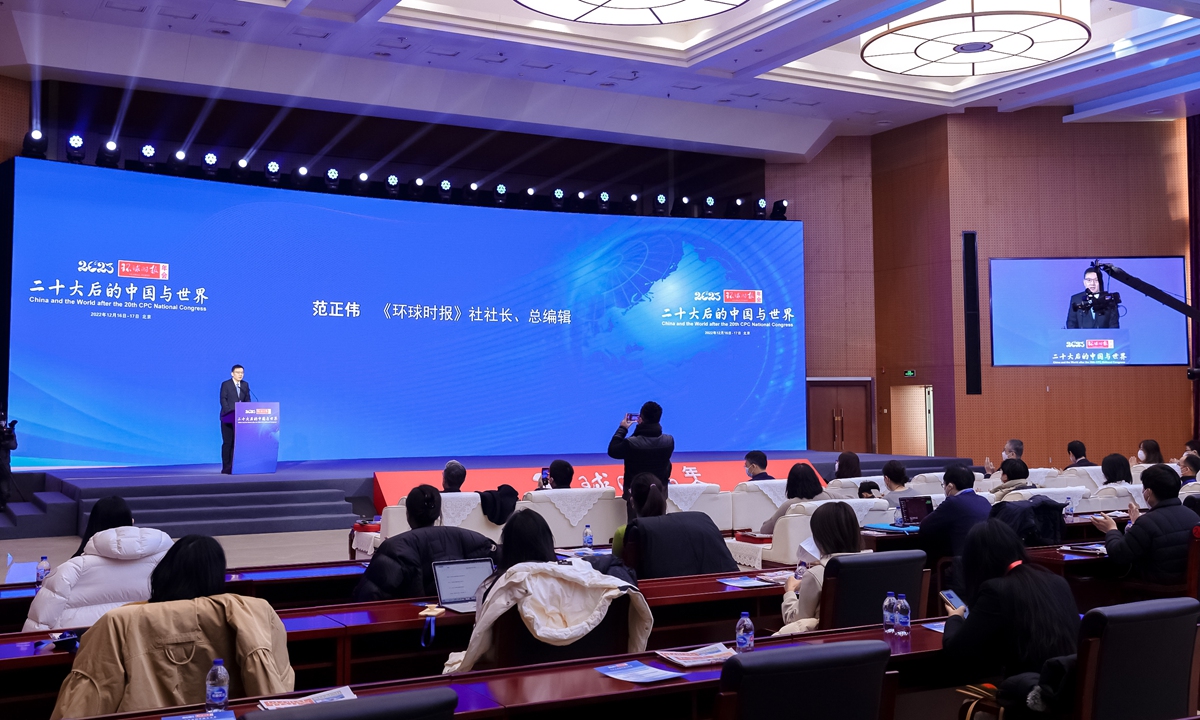The 2023 Global Times Annual Conference themed on “China and the World after the 20th CPC National Congress” was held in Beijing on Saturday. To understand the importance of China’s stability to the changing world and explore what China should do to better grasp opportunities amid challenges in 2023, the Conference focused on four topics including China-US coexistence, cross-Straits reunification, Russia-Ukraine conflict and prospects of China’s economy. The following contains the excerpts of participating experts’ views on the topic of China-US coexistence.
Yang Xiyu, a senior fellow at the Department for Asia-Pacific Studies, China Institute of International Studies:
US intelligence officials last year issued a stark warning: America’s status as a global superpower depends on maintaining a lead in five key technologies including artificial intelligence, quantum computing, bioscience, semiconductors and autonomous systems.
In other words, so-called US’ “decoupling” from China is not a comprehensive “decoupling,” but a selective one. This will indeed have some impact on China. We should look at things from both sides of the coin: When we suffer, we should first look at whether the opponent will also suffer.
In the 1990s when I was working in the US, the US was also imposing comprehensive sanctions on China. Some American companies also expressed dissatisfaction with sanctions against China. At first, there were few voices, but later more and more, and finally they forced then Clinton administration to abandon most of the sanctions against China. President Xi Jinping said China must stay committed to running its own affairs well. When the US is engaged in “selective decoupling” from China, everyone feels very unbearable. If we concentrate our efforts on running our own affairs well, it will make the US feel more unbearable, and finally force it to adjust its policies. Moreover, using administrative means to distort the law of the market is absolutely unsustainable.
Yang Yi, PLA Navy rear admiral:
The essence of the US’ “decoupling” from China is that it uses the law of the jungle to weaken the other side and to strengthen itself, but these are ultimately futile. China will not sit idle and surrender. Instead, we will attract foreign investment by expanding opening-up. From the China International Import Expo, to the Service Trade Fair, to the extensive cooperation with Middle Eastern countries, the door of China is open. The cake of the China’s market is huge. If you don’t take it, more people will come to take it and if you come late, you will have nothing left. The stronger the blockade against China is, the stronger China will become.
Our destiny must be in our own hands
Shen Dingli, a professor of international relations at Fudan University:
The more the US cracks down on us, the more we will strengthen our research and development. In about 10 years to come, the economic volume between China and the US will basically be evened out. In a few more years, by 2049 or 2050, China will become one of the super powers in the world. This is the path we will take. Regardless of US suppression, we have to develop ourselves. Our destiny must be in our own hands.
Huang Renwei, executive director-general, Fudan Institute for Belt and Road and Global Governance:
Whether US-China “decoupling” can be achieved, and to what extent it can be achieved, depends to a certain extent on the US allies’ actions. If they are unwilling to follow the US, the US will have to make changes. Till now, South Korea has not yet followed the US in seeking “decoupling” from China, the European Union has also publicly said decoupling from China is not an option for European companies. I talked with sales representatives of Dutch firm ASML at the CIIE. They said that it will be a matter of time that lithography machines are sold to China and that ASML does not want to lose the Chinese market, otherwise it will be difficult to develop.
He Weiwen, a research fellow at the China Foundation for International Studies:
The US wants to strangle China’s development in five specific areas of cutting-edge technology. In the long run, we will see the US is only a paper tiger and is only shooting itself in the foot. In the end it is the market, not political will, that plays a decisive role. Why has the US so far been able to lead the world’s semiconductor industry? The most fundamental reason is that a large share of its sales revenue has been used for research and development. If it loses sales in the Chinese market, input in research and development will be reduced accordingly. Then it will be hard for its semiconductor industry to continue to maintain its leading position in the world.
In general, we must have confidence in the future. Of course we will go through quite difficult stages. We should concentrate the resources of the whole country on developing advanced technology, and we should break the blockade through opening-up, and implement opening-up resolutely and thoroughly in accordance with relevant policies.
Jin Canrong, a professor of the School of International Studies at the Renmin University of China:
The Russia-Ukraine conflict is bound to have an impact on China-US relations, but it is too early to tell how far. The conflict is still ongoing and will probably last two to three years.
The conflict is not only the biggest international political event this year, but is also the biggest one since the end of the Cold War, because it has dealt a heavy blow to the US-led international system. If the US’ international status declines, it will have a major impact on the world, as well as China-US relations. But it needs about two years to observe to what extent the impact goes.
Yang Xiyu:
There are three major indirect impacts that the Russia-Ukraine conflict has on China-US relations, with two “certainties” and one “uncertainty.”
The first certainty is that it enhanced global geopolitical confrontation and worsened the general atmosphere of China-US relations. The second is that it turned the Taiwan question into a geostrategic one. With the deliberate speculation of some Americans, some opinion began to hype “today’s Ukraine” and “tomorrow’s Taiwan,” which are two fundamentally different issues, bringing new challenges to the solution of the Taiwan question.
This new “uncertainty” means a new security order in Europe. The reason that the Russia-Ukraine conflict broke out is the previous European security order became dysfunctional, but a new one is yet to be built.
Both Russia and the West want to build the order based on their own will. Who will win the war? It is too early to tell. Different security order will have different impact on China-US relations.
Fang Ning, a research fellow at the Institute of Political Science from Chinese Academy of Social Sciences:
When we talk about the impact on China-US relations, we need first to talk about bloc politics. The bloc politics that we witnessed during the Cold War have been brought back by the conflict and may even become more severe. Now the US and other Western countries have become more united as one side, while the other side constitutes countries which do not see eye to eye or dare to challenge the US-led international system.
Huang Renwei: One of the major impacts of the Russia-Ukraine conflict on China-US relations is that geopolitical factors in bilateral relations are becoming prominent. In the 2022 National Security Strategy released in October, the US defines China as the biggest challenge to international order. Geopolitical factors were given such weight in China-US relations for the first time, which will bring more uncertainty to bilateral ties.
China-US relations may become stable in a decade
Yang Xiyu:
If we talk about a new model of the coexistence of China and the US, there should be a premise that the past model did not work properly. China and the US used to be a major power and a superpower, but now they are becoming two superpowers. This requires the two countries to have a new model of relations. The US National Security Strategy said that “this decade will be decisive, in setting the terms of our competition with the PRC.”
Fang Ning: The following factors will determine the new model of China-US coexistence. First, the domestic economic, social and political situation in both China and the US. This includes partisan politics in the US and whether the Chinese economy could soon defeat the pandemic. Second, the trend and result of the Russia-Ukraine conflict. Third, the situation in the Taiwan Straits. Fourth, subfactors such as the nuclear issue on the Korean Peninsula.
He Weiwen: The Russia-Ukraine conflict greatly affects the geopolitical pattern, with the US forcefully promoting bloc confrontation. China-US frictions are bilateral, but they are more part of the growing global bloc confrontation. We need to place China-US relations into a broader global geopolitical pattern.
Huang Renwei:
After the Xi-Biden summit in Bali, Jakarta, China-US relations have a basic starting point, that is, the bottom lines of both sides are stated clear to the other side, and the other side should generally recognize this bottom line. This is the first point of the new China-US model. Second, the two sides should not dash toward the other party’s bottom line. Even if a collision towards the bottom line occurs, the intensity should be tolerated by the other party, so that the bottom lines won’t be crushed. Third, we must find new fields for cooperation. Such a new model is very realistic and can be achieved through the efforts of both parties. But at the same time, forces colliding or crossing the bottom line would arise. Decision-makers on both sides should carry out crisis management and control.
The Russia-Ukraine conflict is playing a role as an early warning to both China and the US. China worries that the crisis may repeat itself on the Taiwan question, while the US is claiming that China may become the second Russia and turn Taiwan into another Ukraine.
More importantly, the US’ Indo-Pacific Strategy is being further concreted, including the launching of the Indo-Pacific Economic Framework, as a major deployment in Southeast Asia. Of course, China has its own moves, like taking a step forward in the Middle East. It can be said that, to some extent, both sides are intensifying their responses to geopolitical factors. This has increased the uncertainty of China-US ties, and both sides concern that this will lead to greater confrontation.
Jin Canrong:
In the next five years, it is highly likely that something big may occur on the Taiwan question, as the current game over the issue among relevant countries and parties are getting increasingly dangerous. The next five years is also a period of critical time for China to catch up with the US, and the latter will be bound to react fiercely. As long as China does not do silly things, it will highly likely make breakthroughs in fields such as chips.
A basic fact is that the world has entered a state of great power competition. The world is undergoing profound changes unseen in a century. This is the great power competition. We should be prepared.
The competition between China and the US will continue for at least 10 years. After 10 years, China will rise, and the US will be forced to accept China’s rise. By then, China-US relations will get better.
Yang Yi:
China and the US have different aspirations or principles, but they have to interact with one another. China advocates building a community with a shared future for mankind, yet the US is attempting to maintain and consolidate its global hegemony. China sticks to building a relationship that features non-conflict, non-confrontation, mutual respect and win-win cooperation. But the US adheres to competing with China from a position of strength.
The key point now is how to compete. At present, there is at least one consensus between the two – preventing competition from heading toward substantive conflict.
The US said that the two sides need to install guardrails for competition. But how? The ways China and the US believe in are at opposite poles. According to the general theory of international relations, in order to maintain a stable relationship while the two sides are in a state of competition, in addition to focus on common threats and common interests, what is more important is reaching the overall balance of power between the two sides.
Generally speaking, the overall strength of the US is stronger than that of China. As time goes by, about 10 years or so, when the balance of power between the two countries tends to be balanced, it may be the time when China-US relations will become relatively stable.

















